I need to create Observable, that will collect information from different sources(other Observables), and each source has impact on the event value, but still, the value is built based on previous value(kind of state machine).
We have message with int value and operation code:
class Message{
Integer value;
String operation;
public Message(Integer value, String operation) {
this.value = value;
this.operation = operation;
}
}
And some source of such values, with init value:
Observable<Message> dynamicMessage = Observable.just(new Message(1, "+"));
Now there are sources of event. These sources will emit values based on which and based on previos value of dynamicMessage the new dynamicMessage value will appear. Actually its events types are:
class Changer1 {
String operation;
public Changer1(String operation) {
this.operation = operation;
}
}
class Changer2 {
Integer value;
public Changer2(Integer value) {
this.value = value;
}
}
Changer1 responcible for changing of operation. Changer2 responcible for value of change.
and sources of these values:
static Observable<Changer1> changers1 = Observable.just(new Changer1("-"))
.delay(1, TimeUnit.SECONDS).concatWith(Observable.just(new Changer1("+"))
.delay(2, TimeUnit.SECONDS));
static Observable<Changer2> changers2 = Observable.just(new Changer2(2))
.delay(2, TimeUnit.SECONDS).concatWith(Observable.just(new Changer2(2))
.delay(2, TimeUnit.SECONDS));
Now I need change dynamicMessage Observable and take in respect messages from changers. here is a diagram:

Also I try to wrote a program, how I see the solution, but it hangs with OutOfMemoryException, rigth after first value:
Message{value=1, operation='+'}
Listing:
import rx.Observable;
import rx.functions.Action1;
import rx.functions.Func1;
public class RxDilemma {
static class Message{
Integer value;
String operation;
public Message(Integer value, String operation) {
this.value = value;
this.operation = operation;
}
@Override
public String toString() {
return "Message{" +
"value=" + value +
", operation='" + operation + '\'' +
'}';
}
}
static class Changer1 {
String operation;
public Changer1(String operation) {
this.operation = operation;
}
@Override
public String toString() {
return "Changer1{" +
"operation='" + operation + '\'' +
'}';
}
}
static class Changer2 {
Integer value;
public Changer2(Integer value) {
this.value = value;
}
@Override
public String toString() {
return "Changer2{" +
"value=" + value +
'}';
}
}
static Observable<Changer1> changers1 = Observable.just(new Changer1("-"))
.delay(1, TimeUnit.SECONDS).concatWith(Observable.just(new Changer1("+"))
.delay(2, TimeUnit.SECONDS));
static Observable<Changer2> changers2 = Observable.just(new Changer2(2))
.delay(2, TimeUnit.SECONDS).concatWith(Observable.just(new Changer2(2))
.delay(2, TimeUnit.SECONDS));
static Observable<Message> dynamicMessage = Observable.just(new Message(1, "+")).mergeWith(changers1.flatMap(new Func1<Changer1, Observable<Message>>() {
@Override
public Observable<Message> call(final Changer1 changer) {
return dynamicMessage.last().map(new Func1<Message, Message>() {
@Override
public Message call(Message message) {
message.operation = changer.operation;
return message;
}
});
}
})).mergeWith(changers2.flatMap(new Func1<Changer2, Observable<Message>>() {
@Override
public Observable<Message> call(final Changer2 changer2) {
return dynamicMessage.last().map(new Func1<Message, Message>() {
@Override
public Message call(Message message) {
if("+".equalsIgnoreCase(message.operation)){
message.value = message.value+changer2.value;
} else if("-".equalsIgnoreCase(message.operation)){
message.value = message.value-changer2.value;
}
return message;
}
});
}
}));
public static void main(String[] args) throws InterruptedException {
dynamicMessage.subscribe(new Action1<Message>() {
@Override
public void call(Message message) {
System.out.println(message);
}
});
Thread.sleep(5000000);
}
}
So what my expected outpur is:
Message{value=1, operation='+'}
Message{value=1, operation='-'}
Message{value=-1, operation='-'}
Message{value=1, operation='+'}
Message{value=2, operation='+'}
Also I thougth about merging all with CombineLatest, but then I found that CombineLatest does not provide which one element was changed, and without this information I will not know which changes in message needs to be done. Any help?